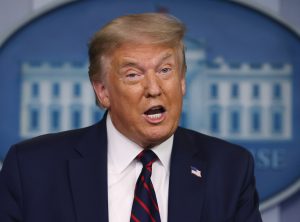
Molly Jong-Fast
October 10, 2020
The answer to this question a few months ago used to be a simple refrain: the secret service and the military will gracefully escort him out of the White House. Suddenly, that has changed. Both serious and popular platforms appear to have come to the realisation that it will not be as simple as that should the push come to shove. That makes this piece interesting, coming from Vogue as opposed to Wall Street Journal or Washington Post. Read and reflect!
Few things are more fundamental to democracy than the peaceful transfer of power; it’s the thing that separates democracies from dictatorships. And so when leaders refuse to clearly and unambiguously commit to it, it’s kind of a big deal.
A lot of people think that while Trump is completely untethered to reality, Mike Pence is more of a traditionalist. And while he’s not great (not by any stretch of the imagination), there’s a sense that the vice president wouldn’t turn America into a terrifying autocracy the way Trump has over the past four years.
So, Mike Pence’s non-answer about a peaceful transition of power at this week’s vice presidential debate ended up being the most important moment of that debate—even though it didn’t get the same kind of airtime as the fly that spent two minutes nestled in Mike Pence’s snowy-white hair.
Pence’s refusal to embrace democratic norms was a terrifying moment for our already flawed democracy, a “traditional” Republican rejecting democratic norms in front of all the world to see. We truly are teetering on the brink of the collapse of democracy—and Mike Pence made that very clear on Wednesday night.
The question from moderator Susan Page was simple enough and should have been a layup for the vice president: “President Trump has several times refused to commit himself to a peaceful transfer of power after the election. If Vice President Biden is declared the winner, and President Trump refused a peaceful transfer of power, what would be your role? What would you personally do? You have two minutes.”
Mike Pence should have said “Yes.” He should have answered that the peaceful transfer of power is an indelible and crucial part of our Constitution. He should have even gently rebuked the president for not answering with his own declarative yes when he was asked almost the exact same question at the presidential debate a week earlier. But Pence hasn’t gotten within one heartbeat of the presidency by demonstrating any willingness to challenge or disagree with the madman in the White House.


Pix credit: Albuquerque Journal
So, as the president did the week before, Pence evaded the question, one that went to the very heart of our democracy.
“Well, Susan, first and foremost, I think we’re going to win this election,” Pence said, a smug smile on his face. “Because while Joe Biden and Kamala Harris rattle off a long litany of the establishment in Washington, DC, that Joe Biden has been a part of for 47 years, President Donald Trump has launched a movement of everyday Americans from every walk of life. And I have every confidence that the same Americans that delivered the historic victory in 2016, they see this President’s record: We have rebuilt the military, revived the economy, with tax cuts, fair trade and American energy. We’ve appointed conservatives to courts at every level, and we’ve stood with the men and women of law enforcement every single day.”
You’ll notice what Mike Pence doesn’t say here. He doesn’t agree to the peaceful transition of power. He doesn’t say that he’ll reign in the hapless autocrat. He doesn’t reassure anyone. He just continues obfuscating for Trump. And sadly for debate viewers, Page didn’t follow up by insisting that Pence actually answer the question she asked, a failure that did not go unnoticed on social media:
Of course, it makes sense that Pence would carry water for his boss: his brand for the past four years has been unbridled sycophancy. And Trump refusing to accept election results is nothing new; he’s said it numerous times over the years, including in 2016, at the third presidential debate in Las Vegas against his then-opponent Hillary Clinton. When asked if he would accept the results of the upcoming election, Trump said, “I will look at it at the time. I will keep you in suspense.” At the time, The New York Times called it “a remarkable statement that seemed to cast doubt on American democracy.” But who thought then that this orange-faced, curiously coiffed reality TV star and bogus billionaire would ever become president? Oh, how innocent we were back then!
October 2016 is a lifetime ago, and the difference between a presidential candidate musing about refusing the “peaceful transition of power” and a president doing the very same thing four years later is a very big deal to everyone except maybe Donald J. Trump and Mike Pence.

 The other odd thing about Trump’s refusal to commit to a peaceful transition of power is that his supporters don’t actually like it. Three in five voters say that Trump should commit now to a peaceful transition. And Morning Consult/Politico polling shows it’s also unsettling the American electorate. The idea of a candidate deciding they’ve won and then not submitting to the results of the election is not very popular with people who consider themselves to be living in a democracy.
The other odd thing about Trump’s refusal to commit to a peaceful transition of power is that his supporters don’t actually like it. Three in five voters say that Trump should commit now to a peaceful transition. And Morning Consult/Politico polling shows it’s also unsettling the American electorate. The idea of a candidate deciding they’ve won and then not submitting to the results of the election is not very popular with people who consider themselves to be living in a democracy.
Appearing on The Daily Show this summer, Joe Biden, raised his own concerns, saying, “This president is going to try to steal this election.” But the Democratic nominee told host Trevor Noah that he was convinced that if Trump loses the Electoral College and yet refuses leave office, military leaders “will escort him from the White House with great dispatch.”
But what happens if Trump really does refuse to accept the election results? Unlikely as that may seem, a number of journalists and constitutional scholars have recently began to explore that hitherto unimaginable possibility and sketch out the tentative scenarios.
In a recent piece in The Atlantic, titled “The Election That Could Break America,” Barton Gellman wrote, “Close students of election law and procedure are warning that conditions are ripe for a constitutional crisis that would leave the nation without an authoritative result.”
Added Gellman: “The worst case, however, is not that Trump rejects the election outcome. The worst case is that he uses his power to prevent a decisive outcome against him. If Trump sheds all restraint, and if his Republican allies play the parts he assigns them, he could obstruct the emergence of a legally unambiguous victory for Biden in the Electoral College and then in Congress. He could prevent the formation of consensus about whether there is any outcome at all. He could seize on that uncertainty to hold on to power.”
In his recently published book, Will He Go?: Trump and the Looming Electoral Meltdown in 2020. Lawrence R. Douglas, a professor at Amherst College, addressed the possible courses of action that Trump might take if he wants to challenge the Nov. 3 election results

 In an online interview about the book, Douglas discussed the nightmare scenario of Trump simply refusing to leave office. “ I cannot imagine Trump conceding defeat—it’s not in his DNA to do so,” Douglas told his interviewer. “If he loses decisively—and by that, I mean not only in the electoral college vote but also in the popular vote of the swing states—he will have no choice but to submit to defeat.”
In an online interview about the book, Douglas discussed the nightmare scenario of Trump simply refusing to leave office. “ I cannot imagine Trump conceding defeat—it’s not in his DNA to do so,” Douglas told his interviewer. “If he loses decisively—and by that, I mean not only in the electoral college vote but also in the popular vote of the swing states—he will have no choice but to submit to defeat.”
“But,” Douglas added, “if his loss turns on the results of mail-in ballot submitted in swing states, then I believe Trump will aggressively work to dispute the result.”
Explained Douglas: “It’s not hard to imagine how this could play out: Trump could enjoy a slim lead in the key swing states on November 3—a lead that vanishes once the mail-ins start getting counted in the days following November 3. And yet all the while Trump is pushing his insistence that only election day results should count; indeed, he brazenly declares that his disappearing lead simply proves his claim of mail-in fraud. Delays in the counting of these ballots increase the possibility that our key swing states—all controlled by Republican state legislatures—certify Trump as having won. And so, like in 1876 [and the disputed election between the popular vote winner, Samuel Tilden, and the eventual victor, Rutherford B. Hayes], we can imagine Congress finding itself confronted with competing electoral certificates at its joint session on January 6, 2021.”
And what do we do if Trump won’t leave? Constitutional scholar Joshua Geltzer recently wrote an article for The Intercept in which he said, “There is no reason to believe Trump will go quietly if he is defeated. There is every reason, however, to believe he and his allies will incite hysteria and even violence. Those who assume otherwise haven’t been paying attention.”
But, as he told Mehdi Hasan on his show Deconstructed, the country should be protected by the rule of law. “The Constitution is clear that on January 20, the term of a current president ends,” Geltzer said. “And it’s also clear that if there isn’t someone whose votes have been certified by Congress as the new president, then the line of succession kicks in.”
And if Trump’s term legally comes to an end without a certified result, and Pence’s along with it, then who would be next in that line of succession? Well folks, it would be House Speaker Nancy Pelosi.
Talk about perfect irony.




























